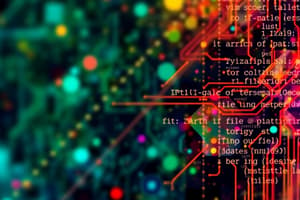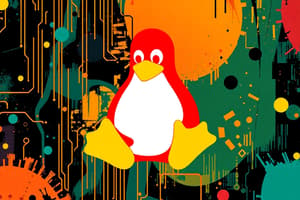Podcast
Questions and Answers
What is the primary role of an Operating System?
What is the primary role of an Operating System?
- To enhance application performance
- To execute instructions in an uninterrupted sequence
- To manage hardware and software resources (correct)
- To process user data into a usable format
Which of the following families do most Operating Systems belong to?
Which of the following families do most Operating Systems belong to?
- Open source and Proprietary
- Windows and Unix (correct)
- Linux and BSD
- Apple and Microsoft
What is the role of the Kernel in an Operating System?
What is the role of the Kernel in an Operating System?
- To perform data encryption for security
- To manage all core system functions (correct)
- To enable user interaction with software
- To provide networking capabilities to programs
What is user mode in the context of an Operating System?
What is user mode in the context of an Operating System?
Which step is NOT involved in process termination?
Which step is NOT involved in process termination?
What does the mode bit on the CPU determine?
What does the mode bit on the CPU determine?
Which of the following is a function provided by the OS kernel?
Which of the following is a function provided by the OS kernel?
When an OS kernel creates a new process, what is the first step it takes?
When an OS kernel creates a new process, what is the first step it takes?
What is the role of an interrupt service routine (ISR)?
What is the role of an interrupt service routine (ISR)?
Which statement about process memory access is true?
Which statement about process memory access is true?
What is the function of the scheduler in an operating system?
What is the function of the scheduler in an operating system?
Which of the following describes a multi-threaded process?
Which of the following describes a multi-threaded process?
What happens to the processor during an interrupt?
What happens to the processor during an interrupt?
What does the task control block (TCB) store?
What does the task control block (TCB) store?
How does modern operating systems primarily operate?
How does modern operating systems primarily operate?
In a single-threaded process, which of the following statements is true?
In a single-threaded process, which of the following statements is true?
Study Notes
Operating Systems Overview
- An Operating System (OS) acts as a bridge between system hardware and application software.
- Key functions of an OS include managing processes, memory, I/O resources, file systems, interrupts, and multitasking.
- Major OS families include Windows and Unix, with the Unix family comprising Linux, Mac OS X, Android, FreeBSD, Solaris, among others.
Kernel and APIs
- The core functions of an OS reside in the 'Kernel'.
- An OS provides Application Programming Interfaces (APIs) for user applications to request services from the Kernel via system calls.
User Mode vs System Mode
- The Kernel operates in a trusted 'system mode', managing CPU functions.
- User processes function in 'user mode', which has limited operational capabilities.
- The mode bit on the CPU indicates the current mode, with transitions controlled by the Kernel.
- System calls enable user processes to access kernel-level functions through traps and trap handlers.
Process Management
- A program is a static instruction set, while a process is an active instance executing those instructions.
- The OS Kernel's responsibilities include creating, terminating, and managing processes.
Process Creation and Termination
- Creating a process involves resource allocation (CPU time, memory, I/O, files) and occurs through several steps:
- Creation of a new process object
- Assignment of a unique process identifier (PID)
- Allocation of memory space and resources
- Establishment of process priority
- Loading program code into memory
- Initiation of execution
- Termination of a process entails:
- Deletion of the process object
- Release of held memory or resources
Anatomy of a Process
- A process can consist of multiple threads, with each thread having its own execution path.
- Threads share resource access like memory space and I/O within the same process, while maintaining separate stacks and register backups.
- Direct access to memory outside a process's allocated space is typically restricted.
Interrupt Management
- An interrupt signifies a device or running process requiring immediate attention.
- The processor responds by:
- Suspending current activities
- Saving the current system state (registers)
- Executing an Interrupt Service Routine (ISR) to manage the event
- After ISR execution, the saved state is restored, resuming prior activities.
- Modern operating systems operate primarily through interrupts.
Multitasking
- A primary advantage of OS is enabling multitasking while coordinating shared hardware resource access.
- The OS assigns CPU access through a scheduler, which manages task execution.
- Each task's context, indicating its execution state, resides in a Task Control Block (TCB), which contains essential execution information.
Studying That Suits You
Use AI to generate personalized quizzes and flashcards to suit your learning preferences.
Related Documents
Description
This quiz covers the fundamental concepts of operating systems, including their key functions, structure, and modes of operation. It explores the roles of the kernel, user mode, and system mode interactions. Test your understanding of major OS families and their attributes.




